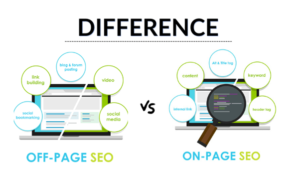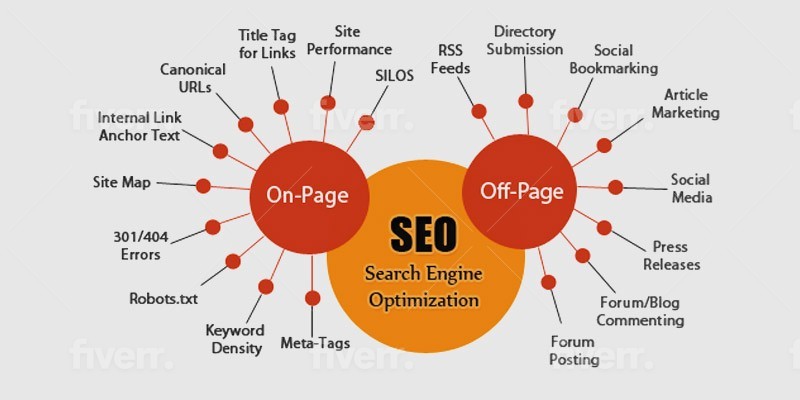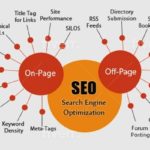SEO is an ever-evolving digital marketing strategy and key to surviving in today’s competitive online marketplace. While on-site SEO focuses on optimizing your website for better visibility to search engines, off-site SEO helps you build relationships with other websites that can help increase your chances of appearing higher up on the search engine results pages or page.
Furthermore, off-site SEO provides many advantages, including building trust and brand existence to widen your customer base and enhance user experience.
This blog post will discuss how businesses can utilize effective off-site SEO strategies to elevate their online presence.
What is Off-Site SEO or Off-Page SEO?
Off-Site SEO, or Off-Page SEO, optimizes a website’s presence on external websites and platforms. This includes a link building strategy, directory submissions, social media engagement, and other prac
tices that help to increase visibility and drive traffic to your website from other sources.
Why Is Off-Site SEO or Off-Page SEO Important?
Off-site SEO, also kn
own as off-page SEO, is crucial for several reasons:
Increased Visibility and Rankings
Off-site SEO helps improve your website’s visibility and rankings in search engine results. When other reputable websites link to your site, search engines consider it as a vote of confidence, indicating the relevance and authority of your content.
Building Authority and Trust
Off-site SEO contributes to building your website’s authority and trustworthiness. When high-quality websites link to your content, it signals to search engines that your site is a valuable resource, leading to higher rankings and increased credibility.
Expanded Organic Traffic
Off-site SEO efforts, such as guest blogging, social media promotion, and influencer partnerships, can drive more organic traffic to your website. By reaching new audiences through external platforms, you can attract potential customers and increase your website’s visibility.
Brand Building and Online Reputation
Off-site SEO activities can positively impact your brand’s online reputation. Sharing and mentioning your content across various platforms increases brand awareness and establishes your authority in your industry.
Long-Term Benefits
Unlike on-site SEO, which focuses on optimizing your website’s elements, off-site SEO provides long-term benefits. Quality backlinks and online mentions can continue to drive traffic and improve search rankings even after the initial promotion.
Competitive Advantage
You can gain a competitive edge online by implementing effective off-site SEO strategies. Building a strong off-site SEO profile can help you outrank competitors and attract more organic traffic to your website.
On-Page SEO vs. Off-Page SEO

On-Page SEO and Off-Page SEO are two essential components of search engine optimization, but they focus on different aspects of optimizing a website.
Here’s a comparison of On-Page SEO and Off-Page SEO:
On-Page SEO
- On-Page SEO refers to optimizing the elements within your website to improve its search engine rankings.
- It involves optimizing page titles, meta descriptions, headings, URL structure, keyword usage, content quality, internal linking, site speed, mobile responsiveness, and user experience.
- On-Page SEO aims to make your website more search engine friendly, improve its relevancy to target keywords, and enhance the overall user experience.
- On-Page SEO directly affects how search engines understand and rank your website’s pages based on relevance, quality, and usability.
Off-Page SEO
- Off-Page SEO refers to optimizing external factors not directly controlled on your website to improve its search engine rankings.
- It involves building high-quality backlinks, social media mentions, influencer marketing, guest blogging, online reputation management, and brand-building activities.
- Off-Page SEO aims to improve your website’s authority, reputation, and popularity across the web, signaling to search engines that your website is a trustworthy and valuable resource.
- Off-Page SEO influences how search engines perceive the credibility and relevance of your website based on external factors such as backlinks and online mentions.
Off-Site or Off-Page SEO Techniques

Off-site SEO includes several strategies that help to increase your website’s visibility and rankings in search engine results.
Here are some techniques you can use:
Link Building (Backlinks)
Link building is the process of acquiring links from external websites to your own site. These backlinks act as “votes of confidence” for search engines, indicating the relevance and authority of your website. Quality backlinks from reputable and relevant sources are highly valuable.
Effective link-building techniques include outreach to other websites, creating high-quality content that naturally attracts backlinks from other sites, and participating in industry-specific directories or resource pages.
Local SEO
Local SEO techniques are essential for businesses targeting a specific geographic area. It involves optimizing your website for local search queries, creating a Google Business Profile (formerly Google My Business) listing, getting listed in local directories, obtaining online reviews, and leveraging local keywords. These techniques help your website appear in local search results and attract relevant local traffic.
Social Media Marketing
Social media platforms allow you to promote your website, engage with your audience, and amplify your content. Sharing your website’s content on social media channels can increase visibility, drive traffic, and encourage social sharing, which may result in more backlinks and improved search engine rankings.
Broken Link Building
Broken link building is finding broken links on other websites and reaching out to webmasters to suggest replacing those broken links with links to your relevant content. It provides value to website owners by helping them fix broken links while benefiting your own website by acquiring new backlinks.
PR (Press Release)
Press releases can be used to announce newsworthy events or developments related to your business. Distributing press releases to relevant media outlets can generate publicity, attract attention from journalists, and potentially earn backlinks from news websites.
However, ensuring that your press releases are newsworthy and valuable to readers is important.
Forums
Participating in relevant online forums and communities allows you to engage with an audience interested in your industry. You can establish yourself as an authority and generate brand awareness by providing helpful insights and contributions.
Some forums also allow you to include a link to your website in your profile or forum signature, creating an opportunity for backlinks.
Guest Posting
Guest posting involves writing and publishing articles or blog posts on other websites as guest authors. It allows you to showcase your expertise, reach new audiences, and earn backlinks to your website. When selecting websites for guest posting, focus on relevant content, high domain authority, and an engaged audience.
Brand Mentions
Brand mentions refer to instances where your brand or website is mentioned on other websites or online platforms without necessarily including a link. Monitoring brand mentions and reaching out to the website owners to request the inclusion of a backlink can help strengthen your off-page SEO efforts and improve your online visibility.
Influencer Marketing
Influencer marketing involves collaborating with influential individuals in your industry to promote your products or services. By leveraging the reach and credibility of influencers, you can increase brand awareness, attract a larger audience, and potentially earn backlinks as influencers share your content or mention your brand on their platforms.
Implementing these off-site SEO techniques can help improve your website’s visibility, authority, and search engine rankings, ultimately driving more organic traffic and increasing your online presence.
Why Does Off-Site SEO Matter

Increased Website Authority
Off-site SEO techniques, such as link building and brand mentions, contribute to building your website’s authority and search engine ranking. When reputable and relevant websites link to your content, search engines consider it as a vote of confidence, indicating the quality and trustworthiness of your website. Higher authority leads to improved search engine rankings and visibility.
Improved Search Engine Rankings
Off-site SEO plays a significant role in determining your website’s search engine rankings. Search engines evaluate your website’s on-page elements and consider external factors, such as backlinks and social signals, to assess its relevance and credibility.
A strong off page SEO strategy can help your website rank higher in search results, driving more organic traffic.
Enhanced Online Visibility
Off-site SEO techniques expand your website’s online visibility beyond its domain. You increase the web page’ chances of reaching a wider audience by promoting your content, building backlinks, and engaging with external platforms.
This broader visibility can lead to increased brand awareness, exposure, and the opportunity to attract more visitors to your website.
Trust and Reputation Building
Off-site SEO contributes to building trust and a positive reputation for your website. When other reputable websites or influencers mention and share your content, it adds credibility and authority to your brand.
Positive brand mentions, and reviews also help establish trust among users, encouraging them to visit and engage with your website.
Long-Term Results
Off-site SEO techniques provide long-term benefits. Quality backlinks and brand mentions can continue to drive traffic to your website even after the initial promotion. Investing in off-site SEO builds a solid foundation for sustainable organic growth and maintains a competitive advantage in search engine rankings.
Referral Traffic
Off-site SEO activities, such as guest posting and social media promotion, can drive referral traffic to your website. When users encounter your content on external platforms, they may click through to visit your website, leading to increased engagement, conversions, and potential customers.
Off-site SEO improves your website’s authority, search engine rankings, online visibility, trust, and long-term growth. By implementing effective off-site SEO strategies, you can enhance your website’s overall online presence and attract a larger audience of engaged users.
Types Of Off-Page SEO Links

When it comes to building links to off-page SEO, several well-known types of links are commonly used. These include:
Natural Editorial Links
These are links earned organically when other websites find your content valuable and link to it without any influence or solicitation from you. Search engines highly regard these natural links, as they indicate your content’s genuine relevance and authority.
Guest Post Links
Guest posting involves writing articles or blog posts for other websites as a guest author. In return, you usually get an author bio or byline with a link to your website. Guest post links can help you reach new audiences, increase your website’s visibility, and generate relevant traffic.
Social Media Links
Sharing your content on social media platforms can generate links when users share, retweet, or repost your content. Social media links may not directly impact search engine rankings, but they can drive traffic to your website and increase your online visibility.
Directory Links
Directory links involve submitting your website to online directories that categorize and list businesses or websites. While general directories may have limited SEO value, niche-specific and authoritative directories can provide relevant backlinks and help with local SEO.
Factors That Influence Link Value for Off-Page SEO
Link value plays a major role in off-page SEO and helps search engines determine the quality of your website. The following Off-page SEO factors can influence the link value:
Relevance & Authority
Links from relevant websites with high domain authority are more valuable to other search engines than links from unrelated sites with low domain authority. Search engines give more weight to backlinks from credible sources, indicating the relevance of your content.
Link Quality
The quality of a link is determined by factors such as anchor text, page authority, trustworthiness, and context. Search engines consider high-quality links when assessing your website’s value and emphasize good-quality backlinks more than irrelevant ones.
Link Placement
The placement of a link also determines its value. Links placed within the body of an article or blog post have more SEO value than those embedded in footers, sidebars, or author bios.
Link Diversity
Having a variety of different types of links from multiple sources helps improve your website’s link profile and search engine rankings. Search engines prefer naturally acquired backlinks from respected websites to manufactured ones. Therefore, diversifying your link sources can help increase the value of your backlinks.
FAQs
What is Off-site SEO?
Off-site SEO is a collection of techniques used to improve your website’s search engine visibility. It involves activities such as link building, guest blogging, and social media marketing that help increase the quality of links pointing back to your website from other websites, thus increasing its trustworthiness in the eyes of major search engines like Google or Bing.
How can I improve my off-site SEO?
Off-site SEO can be improved by implementing a variety of practices and strategies. For example, you can build links from other reputable websites, post content on social media to reach a larger audience or create guest posts on other blogs to increase visibility and generate more backlinks.
What are some common off-site SEO mistakes?
Common off-site SEO mistakes include excessive link building, focusing too much on specific keywords or phrases when creating content, and neglecting to use appropriate anchor texts for links. Additionally, failing to track your efforts consistently can lead to ineffective strategies that don’t bring the desired results.
Conclusion
In conclusion, off-site SEO or off-page SEO is an effective technique used to drive organic traffic and promote better visibility for websites. It is important because it helps search engines understand your website’s relevance and helps you gain organic ranking. Ultimately, if you want to improve your visibility in search and generate more organic traffic, then embracing off-site SEO is an essential part of any successful online strategy. Take action now by utilizing the power of off-site SEO!












